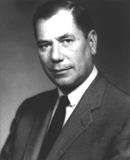Thomas S. Gates
Thomas Sovereign Gates Jr. (born April 10, 1906 in Germantown , Pennsylvania , † March 25, 1983 in Philadelphia , Pennsylvania) was an American politician and United States Secretary of the Navy from April 1, 1957 to June 8, 1959 (Secretary of State for the Navy) and Secretary of Defense of the United States from December 2, 1959 to January 20, 1961 under President Dwight D. Eisenhower .
Life
The son of an investment banker graduated from the University of Pennsylvania in 1928 and then worked for the investment bank Drexel and Company (one of the predecessor companies of JPMorgan Chase and Morgan Stanley ). He served in the US Navy during World War II . Since 1953, he served as Under Secretary of the Navy, the second most senior officer in the Department of Defense's Naval Office . On April 1, 1957, he was appointed Secretary of State for the Navy. From December 2, 1959 to January 20, 1961, he was Minister of Defense in the Eisenhower cabinet . Gates was more involved than his predecessors in the development of the United States' security and defense doctrine. He promoted President Eisenhower's efforts to replace the previously more defensive containment plans against Soviet expansionist efforts with a more aggressive rollback policy . During his tenure, Francis Gary Powers was shot down over Soviet territory, causing considerable diplomatic turmoil.

Gates was involved in the so-called Fibag affair through his German counterpart Franz Josef Strauss . The then Federal Defense Minister had recommended the company Fibag (Finanzbau Aktiengesellschaft) to Gates to build several thousand apartments for the US Army in Germany. Among other things, Strauss himself was involved in Fibag.
After the victory of the Democrat John F. Kennedy in the presidential election in 1960 , he resigned as Secretary of Defense on January 20, 1961. He became president of the Morgan Guaranty Trust Company in 1962 (merged in 1959 from JP Morgan & Co. and Guaranty Trust Company of New York), but also worked several times as an advisor to various presidents of the United States. He was from 1976 to 1977, succeeding George Bush Head of the then United States Liaison Office ( Liaison Office ) in the People's Republic of China with the rank of ambassador . Since 1959 he was an elected member of the American Philosophical Society .
Gates died in 1983. The USS Thomas S. Gates , a guided missile cruiser of the Ticonderoga-class , was named after the former Secretary of State for the Navy. He has been the namesake of Cape Gates on Carney Island in Antarctica since 1967 .
Web links
- Official Biography of the US Department of Defense about Thomas S. Gates (English)
- Thomas S. Gates in the Miller Center of Public Affairs of the University of Virginia (English)
Individual evidence
- ^ Member History: Thomas Sovereign Gates. American Philosophical Society, accessed August 17, 2018 .
| personal data | |
|---|---|
| SURNAME | Gates, Thomas S. |
| ALTERNATIVE NAMES | Gates, Thomas Sovereign junior (full name) |
| BRIEF DESCRIPTION | American politician and diplomat |
| DATE OF BIRTH | April 10, 1906 |
| PLACE OF BIRTH | Germantown , Pennsylvania |
| DATE OF DEATH | March 25, 1983 |
| Place of death | Philadelphia , Pennsylvania |


